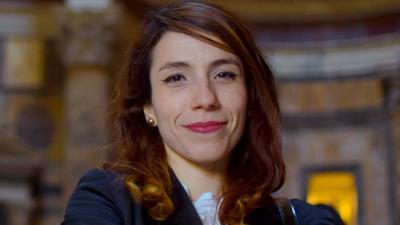The Mathias Corvinus Collegium held the MCC Feszt from 27-29 July, an event that in its third edition brought together thousands of people – more than 47,000 as compared to the 10,000 who had attended it the first time in Esztergom. Over the course of three days, the attendees could visit some 100 exhibitors, listen to 120 talks in Hungarian or English on various stages around the city, or attend concerts in the evening. There was also an eye-catching army display, complete with vehicles and weapons, and a fire brigade show. Both were favourites with the many children who wandered up and down the streets, enthralled by the festival. Of course, there was a majority of young people, but also older people and families, many families, all in absolute normality.
As I have already mentioned, 120 talks took place, with the total of 250 speakers participating in them. The talks, which also included book presentations, dealt with everything from the confrontation between Brussels and Hungary through immigration to the situation of religion in the world. I had the honour of participating in a panel chaired by Jorge Gallarza, in which Alejandro Peña Esclusa presented his book “The Culture War of the Sao Paulo Forum”, which has been translated into Hungarian. Many may think that the Sao Paulo Forum is far away from countries like Hungary, but evil knows no borders, and the pernicious influence and money of the Forum is also present in Europe - as we know very well in Spain from the rise of Podemos. Very close to Hungary, in Slovenia, the Levica party, whose leaders have a close relationship with the Bolivarian dictatorship, is part of the government and applies woke policies and whitewashing of communist crimes, eliminating, for example, remembrance day for the victims of communism. But this talk, and others, will be commented on in future articles, so I won’t go any further, except to point out the absolute normality with which each and every one of the debates took place.
Beauty matters, and Esztergom, the city on the Danube that has hosted the MCC festival for the last three years, is a very beautiful town full of history. It was the capital for more than 200 years and saw the birth of Hungary’s first king, Stephen I, and his coronation in the year 1000. The city is also the seat of the country’s Catholic Church and is known as the Hungarian Rome. Its basilica is the symbol of the city. It is also the largest church in Hungary, the third largest in Europe and the tallest building in the country. Besides its castle, and even the remains of an Ottoman mosque, witness to the cruel Turkish rule in the past, this city on the Danube boasts baroque buildings, and a statue of the Holy Trinity presides over its main square. As I wandered around, taking pictures of monuments and landscapes, I noticed that I was holding my mobile phone in my hand quite casually and recalled my visit to Barcelona just a month ago. There I took some photos too, of the Sagrada Familia and a few other places, but after taking each photo I put my phone back in my pocket. Barcelona, after years of separatist and left-wing politics, is no longer a safe city, and practically every day there are robberies and assaults, known thanks to the fact that the news spread like wildfire across social networks. I was also in the south of France, where the streets are patrolled by armed soldiers to prevent terrorist attacks. But none of that happens in Hungary, nor in Poland, because the laws and borders are in place to protect their citizens. What is happening in most of Western Europe is that what was once normal is now labelled ”right-wing extremism”, while ghettos, crime, filth and squalor are seen as inevitable consequences of progress.
Even progress has changed its meaning and is no longer about improving the quality of life. No - progress is now about losing rights and freedoms to eternally oppressed minorities, even if the latter are in power, having a choice of 200 genders or exchanging a steak for a maggot omelette. This is why more and more of us are voting “wrong” and longing for the old normality, that normality which, in many cases, we can only find outside our own front doors. For that reason, it is worth jumping over the wall of our progressive paradise, before we are banned for our excessive carbon footprint, and find that there is another Europe where that wonderful sense of normality still exists.
Read also
Interview with Andrzej Podgurski – spokesman for the Polish Legion
Andrzej Podgurski is a Polish journalist and volunteer. A war correspondent since the beginning of the full-scale Russian invasion, he is the spokesman for the Polish Legion, an umbrella organization of humanitarian and military volunteers in Ukraine.
Álvaro Peñas
Keep voting wrong
In January 2022, a month before the Russian invasion of Ukraine, MEP Esteban Gonzalez Pons, Vice-President of the European People’s Party, made what were probably the most regrettable – though honest – statements of his career.
Álvaro Peñas
Estefanía Meléndez: “Venezuela, like Russia, plays on fear and propaganda, but that can backfire”
Estefanía Meléndez is is a Venezuelan opposition activist who, during Venezuela's presidential crisis in 2019, was appointed by the National Assembly as Venezuela’s ambassador to Bulgaria with “concurrent” work to North Macedonia, Montenegro and Albania.
Álvaro Peñas
José Manuel Candón: “Right now, Ukraine is the most heavily mined country in the world”
Those at the front are defending the freedom of those at the rear, and if the enemy should succeed in curtailing the freedom of the rear, then he would be winning.












Comments (0)